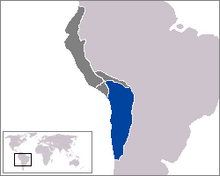This article needs additional citations for verification. (January 2013) |
| Qullasuyu | |||||||
|---|---|---|---|---|---|---|---|
| Suyu of Inca Empire | |||||||
| 1438–1535 | |||||||
 Qullasuyu within the Inca Empire | |||||||
| Capital | Hatunqulla | ||||||
| Historical era | Pre-Columbian Peru | ||||||
• Established | 1438 | ||||||
| 1535 | |||||||
| 1541 | |||||||
| Subdivisions | |||||||
| • Type | Wamani | ||||||
| |||||||
Qullasuyu (Quechua and Aymara spelling, ; Collasuyu, Kholla Suyu; Spanish: Collasuyo) was the southeastern provincial region of the Inca Empire. Qullasuyu is the region of the Qulla and related specifically to the native Qulla Quechuas who primarily resided in areas such as Cochabamba and Potosí. Most Aymara territories which are now largely incorporated into the modern South American states of northern Chile, Peru, Bolivia and the Argentine northwest were annexed during the reign of Sapa Inca Huayna Cápac in the sixteenth century.
Recently, there have been movements to form a "Greater Qullasuyu" (or Qullana Suyu Marka) which would incorporate a territory similar to the former Tawantinsuyu in extent. This ideal has been proposed by the office of the Apu Mallku and the parliament of the Qullana. Qullasuyu was the largest of the four suyu (or "quarters", the largest divisions of the Inca empire) in terms of area. This suyu encompassed the Bolivian Altiplano and much of the southern Andes, running down into northwest Argentina and as far south as the Maule river near modern Santiago, Chile.[1] Along with Kuntisuyu, it was part of the Hurin Suyukuna or "Lower Quarters" of the empire.[2][3]
